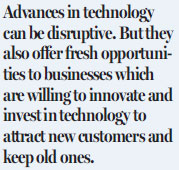Technology is a disruptive but unstoppable force
Updated: 2017-03-07 07:06
(HK Edition)
|
|||||||
Ride-hailing firm Uber had a big boost in Hong Kong as insurance company AIG agreed to provide third-party coverage for Uber drivers on terms believed to be more favorable than previous arrangements.
Some taxi owners and drivers took to the streets on Feb 23 to protest against the "legalization" of Uber, which they saw as a serious threat to their livelihoods. Taxi owners who paid many millions of dollars for taxi licenses, worth about HK$7 million apiece at the going rate, are particularly irked by the intrusion of Uber technology.
The taxi business is far from alone in facing disruption by new technology. Even the formidably conservative banking industry, which carries a heavy responsibility to the public, is feeling the pressure to keep abreast of the latest innovations in finance and investment.
There is something to be learned from the manufacturing industry, which has evolved to cope with advances in technology since the beginning of the industrial revolution in the 18th century. Robots have taken over many factory jobs done by humans not too long ago.
The governments of most developed economies are trying to address social problems arising from the loss of jobs to automation; they realize it's futile and counterproductive to block the progress of technology.

Take Uber for example. The Hong Kong government would be hard put to find a pretext, other than outright protectionism, to ban Uber when the company shows it has complied with all existing rules and regulations on public transport.
What's more, the success of the company's model in Hong Kong and other cities shows the public needs such a service.
Some taxi operators have tried to group together and offer similar services to compete. They should try to continue to improve their model and make it a success for the benefit of the public, instead of pressuring the government to restrict competition.
At one time the very existence of traditional banks, especially those in the United States, was believed to be threatened by the proliferation of startups offering depositors and lenders the convenience of internet banking. But so far most of the rivals have failed to make inroads into the financial marketplace while some survive by selling the apps they develop to established banks.
It was reported that an early startup, Moven, founded by entrepreneur Brett King, who wrote the book Breaking Banks, has opened 60,000 accounts, far short of his promise of becoming the Facebook of banking. Now, Moven and many other internet banking startups find it necessary to work with the big banks they once scorned.
This does not mean the failure of the idea which promises to bring real benefits of convenience to consumers. It simply means that traditional banks are in a much stronger position to offer such convenience because of their large client base and access to low-cost funds in the form of customers' deposits.
Entrepreneurs in Silicon Valley and other high-tech centers around the world have learned that running a bank, whether on the internet or the high street, is very different from starting up social media sites. In banking, financial clout and established credibility count.
Recognizing that internet banking has a way to go, many major banks around the world are investing in the technology to compete among themselves for customers. HSBC, Hong Kong's largest financial institution, is cutting costs by laying off many staff and closing branches, but it has earmarked $2 billion for investment in what Group Chief Executive Stuart Gulliver called "digital transformation initiatives to improve our offer to customers".
Advances in technology can be disruptive. But they also offer fresh opportunities to businesses which are willing to innovate and invest in technology to attract new customers and keep old ones.
The author is a veteran current affairs commentator.
(HK Edition 03/07/2017 page8)